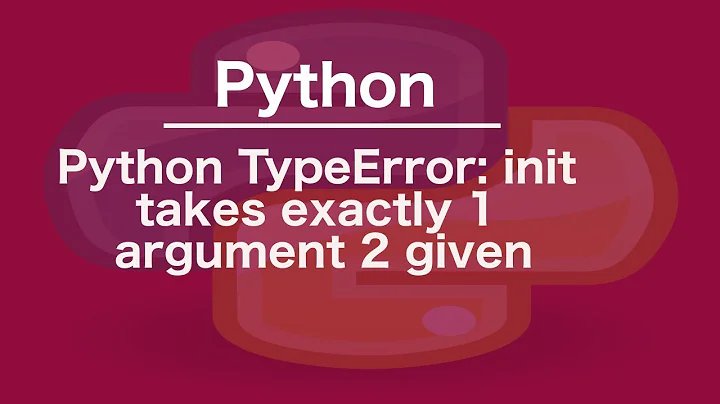Why is lambda asking for 2 arguments despite being given 2 arguments?
Solution 1
Why do you use 2 arguments? filter() and map() require a function with a single argument only, e.g.:
filter(lambda x: x >= 2, [1, 2, 3])
>>> [2, 3]
To find the factors of a number (you can substitute it with lambda as well):
def factors(x):
return [n for n in range(1, x + 1) if x % n == 0]
factors(20)
>>> [1, 2, 4, 5, 10, 20]
Solution 2
If you run map or filter on a key-value set, then add parentheses around (k,v), like:
.filter(lambda (k,v): k*2 + v)
Solution 3
Because filter in python takes only one argument. So you need to define a lambda/function that takes only one argument if you want to use it in filter.
Related videos on Youtube
ritratt
Updated on September 15, 2022Comments
-
ritratt almost 2 years
This is my code:
filter(lambda n,r: not n%r,range(10,20))I get the error:
TypeError: <lambda>() takes exactly 2 arguments (1 given)So then I tried:
foo=lambda n,r:not n%rWhich worked fine. So I thought this will work:
bar=filter(foo,range(10,20))but again:
TypeError: <lambda>() takes exactly 2 arguments (1 given)Something similar happens for map as well. But reduce works fine. What am I doing wrong? Am I missing something crucial needed in order to use filter or map?
-
NullUserException
filter()passes a single argument to your lambda, when it expects two. Using a variable won't let you get around it.
-
-
ritratt over 11 yearsOk that makes sense. So then how do I go about writing this code, which has to return factors for a number. I want to use filter or map so that I understand it better...or at least lambda
-
NullUserException over 11 yearsOf course you could optimize this to just search up to sqrt(x), and add x/n and n to the results whenever
x % n == 0. It will make a difference when the numbers get larger. -
 abhay dalvi over 5 yearsYour original problem can be solved using list comprehension as below >>> [n for n in range(10,20) for r in range(10,20) if not n%r] [10, 11, 12, 13, 14, 15, 16, 17, 18, 19] >>>
abhay dalvi over 5 yearsYour original problem can be solved using list comprehension as below >>> [n for n in range(10,20) for r in range(10,20) if not n%r] [10, 11, 12, 13, 14, 15, 16, 17, 18, 19] >>>

![Step 3: Diagramming Short Arguments [Example 2, Part 2]](https://i.ytimg.com/vi/oK4oRd8_sMY/hq720.jpg?sqp=-oaymwEcCNAFEJQDSFXyq4qpAw4IARUAAIhCGAFwAcABBg==&rs=AOn4CLCkzdeBmxsFjjikTUeG6a8vRqZWjw)










